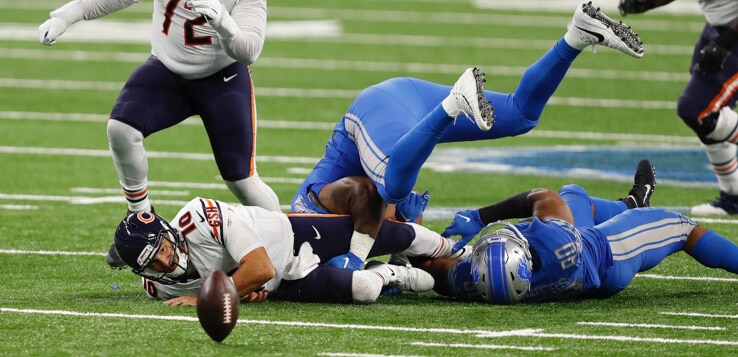The 10th anniversary just passed of the arrest of the operator of perhaps the largest NFL “survivor” pool in New Jersey — and possibly a contender for largest in the U.S.
With that arrest, the Monmouth County Prosecutor’s Office seized more than $800,000 from John Bovery, a schoolteacher and former Wall Street broker whose 20-year-old pool had become regionally famous as it grew ever larger.
Last week, a three-judge New Jersey Appellate Division panel backed a lower-court ruling that Bovery could not sue the prosecutors for malicious prosecution.
“Because we are satisfied plaintiff’s amended complaint ‘states no basis for relief, and discovery would not provide one,’ we affirm,” the judges wrote in a 16-page opinion.
“Suffice it to note that we rejected Bovery’s argument that the money seized ‘was not used in furtherance of unlawful activity because the pools did not constitute illegal gambling’ and found his argument that the seizure ‘exemplifie[d] the potential for abuse in the forfeiture statute’ so lacking in merit as to not warrant discussion in a written opinion.
“Bovery contends the combination of the first-degree charge and the exorbitant bail devastated his ability to obtain work and wrongfully delayed his entry into the pre-trial intervention program,” the judges wrote.
Guilty plea turns out to be key
In 2001, Bovery spent 25 days in jail after he was charged and a judge ordered $250,000 cash bail — funds that Bovery did not have.
Ultimately, Bovery pled guilty in 2016 to an amended charge of third-degree possession of gambling records, and — with no criminal record -—he was admitted into that pre-trial program. Once Bovery completed it, the charge was dismissed.
And Bovery continued his quixotic quest to have prosecutors held accountable for the seizure of his assets — including, he has claimed, more than $100,000 of savings unrelated to the massive survivor pool.
The judges, however, noted that Bovery’s guilty plea, even though it resulted in no jail time, precluded his malicious prosecution claims:
“We also agree with the trial judge that Bovery’s claim that the prosecutors instituted and pressed the money laundering charge to pressure him into capitulating to the forfeiture is conclusory and based entirely on speculation and hearsay.
“Further, Bovery’s premise is faulty. The prosecutors did not need his capitulation to succeed on the forfeiture. They secured summary judgment on an undisputed record.”
Not your neighborhood bookie
Bovery is not a classic bookmaker who takes cash from gamblers, typically against a point spread that levels the playing field for football teams of differing skill levels, and then keeps 5% of every two bets on opposite sides.
He accepted thousands of entries annually, with each competitor choosing one NFL team that must win its game for the player to “survive.” The twist is that each team can only be chosen once and the large number of entrants entices the savvier players to gamble on a modest favorite in some early weeks so that, if they survive, they have an advantage later in the season by having some of the league’s best teams as remaining options.
According to New Jersey law, “A person is guilty of promoting gambling, according to the law, when he or she (a)ccepts or receives money or other property, pursuant to an agreement or understanding with any person whereby he participates or will participate in the proceeds of gambling activity.”
A complication here is that — much like a high roller at a casino who wins a big jackpot and elects to tip the dealer — many of the six-figure winners, as well as smaller winners, paid Bovery.
The inaugural 1990 contest had 57 players at $50 apiece, with the two co-winners splitting the entire pot.
By 2004, $100 entrants ballooned the pot to $347,000 — and Bovery has acknowledged in the pool’s later years that he suggested that big winners might want to “gift” him 10% of their prize.
Parallel tracks of NJ gambling options
This saga has run on so long that, since Bovery’s initial arrest:
- New Jersey passed a sports betting law in 2012, the year that the NFL and four other sports organizations sued the state over allegations that it violated the federal Professional and Amateur Sports Protection Act of 1992;
- The leagues prevailed in U.S. District Court;
- The leagues prevailed again at the U.S. Third Circuit Court of Appeals;
- The U.S. Supreme Court refused to take the case;
- New Jersey passed an amended sports betting law, this time without direct governmental regulatory oversight over the gambling at the state’s racetracks and Atlantic City casinos;
- The leagues prevailed again at the District and Appeals court levels, adding a bonus victory when a Third Circuit “en banc” full panel of a dozen judges also affirmed the previous rulings;
- The state again appealed to the Supreme Court, this time successfully;
- The nation’s highest court invalidated PASPA as unconstitutional, opening the door for any state to match Nevada’s “Las Vegas-style” sports betting;
- New Jersey’s casinos and tracks now run legal, regulated sportsbooks — both brick-and-mortar and online.
But an operator of a massive survivor pool who takes “tips” from winners? That — at least to this point — is a bridge too far for New Jersey law enforcement.








